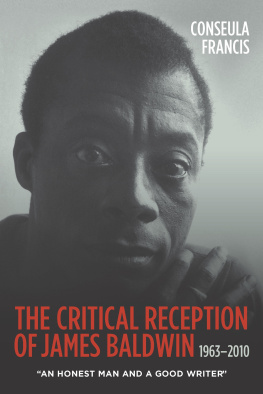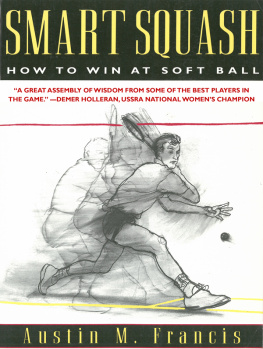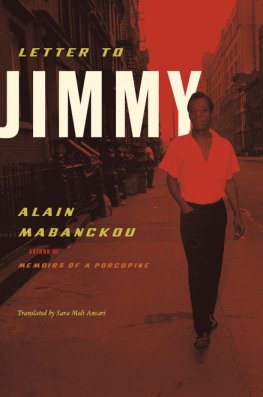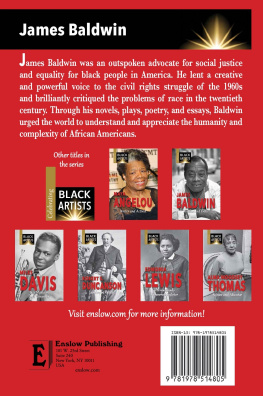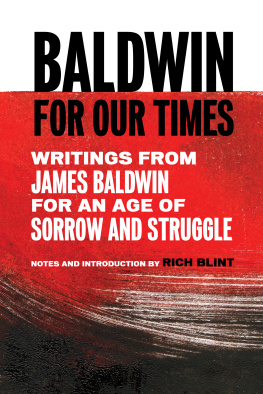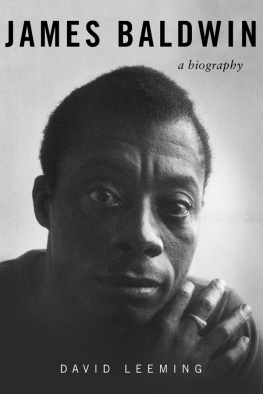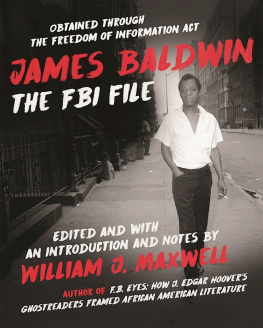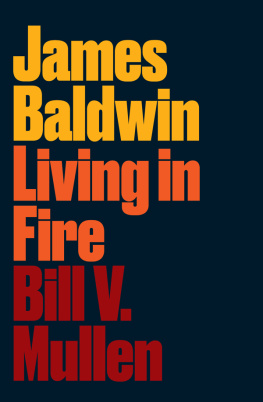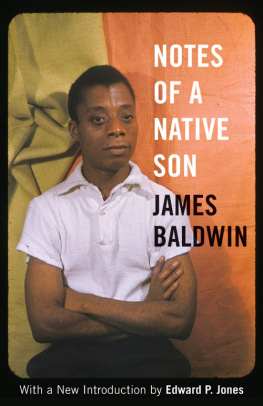The Critical Reception of James Baldwin, 1963 2010
James Baldwin is a widely taught and anthologized author. His short story Sonnys Blues remains a perennial favourite in literature anthologies, and all of his essay collections and novels are still in print. His first essay collection, Notes of a Native Son , is a seminal work that led a new generation of African American writers from beneath the shadow of Richard Wright. The Fire Next Time is widely held as one of the most profound and accurate articulations of black consciousness during the Civil Rights movement. It is difficult to imagine teaching a survey of African American literature or considering the development of black intellectual thought in the twentieth century without mentioning Baldwin.
For more than half a century, readers and critics alike have agreed that Baldwin is a major African American writer. What they do not agree on is why. Because of his artistic and intellectual complexity, his work resists easy categorization, and Baldwin scholarship, consequently, spans the critical horizon. Conseula Franciss book examines the major divisions in Baldwin criticism, paying particular attention to the way each critical period defines Baldwin and his work for its own purposes.
As its title reveals, this well-researched and engagingly written study is a biography of Baldwins critical reception [which] provides a thorough, smartly contextualized overview of the various ways Baldwins wide-ranging oeuvre has been received, both during his lifetime and after. Her survey of Baldwin criticism and reasons for his popularity are instructive for anyone who teaches or reads Baldwin. Summing Up: Highly recommended. All readers. CHOICE.
Studies in American Literature and Culture:
Literary Criticism in Perspective
Brian Yothers, Series Editor
( El Paso, Texas )
About Literary Criticism in Perspective
Books in the series Literary Criticism in Perspective trace literary scholarship and criticism on major and neglected writers alike, or on a single major work, a group of writers, a literary school or movement. In so doing the authorsauthorities on the topic in question who are also well-versed in the principles and history of literary criticismaddress a readership consisting of scholars, students of literature at the graduate and undergraduate level, and the general reader. One of the primary purposes of the series is to illuminate the nature of literary criticism itself, to gauge the influence of social and historic currents on aesthetic judgments once thought objective and normative.
Contents
Acknowledgments
A NY BOOK OWES ITS EXISTENCE to many more people than the name that appears on the front cover, and this book is no different.
This book simply would not exist without the scarily efficient assistance of my graduate student Ed Lenahan.
Emmanuel Nelson proved an incomparable source of knowledge of all things Baldwin.
I could not have navigated the byzantine manuscript-to-book process without the patience and guidance of Jim Walker.
Scott Peeples, an editor and colleague par excellence, was a model of encouragement and camaraderie.
Claire Curtis and Alison Piepmeier, two-thirds of Super Ninja Writing Force, held my hand through every stage of the writing process and the book is better for it.
Frances and Cate, the Girls, were relentless in their efforts to derail the entire project at the exact same time as they were my biggest cheerleaders.
And Brian kept me supplied with comic books, purple pens, and endless debates about the minutiae of Star Wars , as every good husband should.
Introduction
All art is a kind of confession, more or less oblique. All artists, if they are to survive, are forced, at last, to tell the whole story, to vomit the anguish up.
James Baldwin, Northern Protestant
I T IS DIFFICULT TO CONSIDER a survey of African American literature or the development of black intellectual thought in the twentieth century without some mention of James Baldwin. His short story Sonnys Blues remains a perennial favorite in literature anthologies and all of Baldwins essay collections and novels remain in print. His first essay collection, Notes of a Native Son , is a seminal work that led a new generation of African American writers out from under the shadow of Richard Wright. The Fire Next Time is one of the most profound and accurate articulations of black consciousness during the civil rights movement. Readers and critics alike, for the past sixty years, generally agree that James Baldwin is a major African American writer. What they do not agree on is why. As a result, the reception of James Baldwin has been equal parts critical devotion and critical neglect.
Writing in Black Women in the Fiction of James Baldwin (1985), Trudier Harris laments that despite being one of Americas best-known writers, and certainly one of its best-known black writers, [Baldwin] has not attained a more substantial place in the scholarship on Afro-American writers (34). Craig Werner asserts that the general silence [on Baldwins work in African American literary criticism] suggests that the larger changes in intellectual fashion have influenced the internal dynamics of discourse on Afro-American culture (The Economic Evolution of James Baldwin, 107). For example, the teachers guide that accompanied the first edition of the Norton Anthology of African American Literature , which includes a number of Baldwins selections, failed to include James Baldwin in its list of major authors who have an undeniable genius or panache that uniquely distills the best [the] tradition has to offer. Manning Marables 2003 collection of political black writing, Let Nobody Turn Us Around: Voices on Resistance, Reform, and Renewal , a collection Henry Louis Gates, Jr. calls a broad compilation of the signal primary sources through which black people articulated both their always shifting and always various definitions of what, precisely, a black identity is, as well as the most efficacious methods through which to achieve our freedom, fails to mention Baldwin at all (quote from back cover).
This book is an examination of the paradox of how Baldwin is both significant to our understanding of the African American literary tradition yet remains on the periphery of that tradition. This seeming marginality, I contend, arises, ironically, from the widespread critical availability of Baldwins work. The work of writers like Toni Morrison, Zora Neale Hurston, Richard Wright, and Ralph Ellison (to name but a few) commands sustained, focused critical attention, wherein critics generally agree on the most significant critical issues. No such agreement exists in Baldwin criticism. Baldwins work speaks to, validates, and challenges a variety of critical sensibilities, resulting in his central-yet-still-marginal status in African American letters. He writes openly of homosexuality in his fiction, but seemed reluctant in his life to accept that identity as defining of his experience. He drew heavily for imagery and symbolism from the black church, but never shied from criticizing that church. He is unrelenting in his criticism of America and American institutions, yet always spoke as one of its most committed citizens. Because of this artistic and intellectual complexity, Baldwins work resists easy categorization and, consequently, Baldwin scholarship spans the critical horizon. In this book I examine the major divisions in Baldwin criticism, paying particular attention to the way each critical period defines Baldwin and his work for its own purposes.

